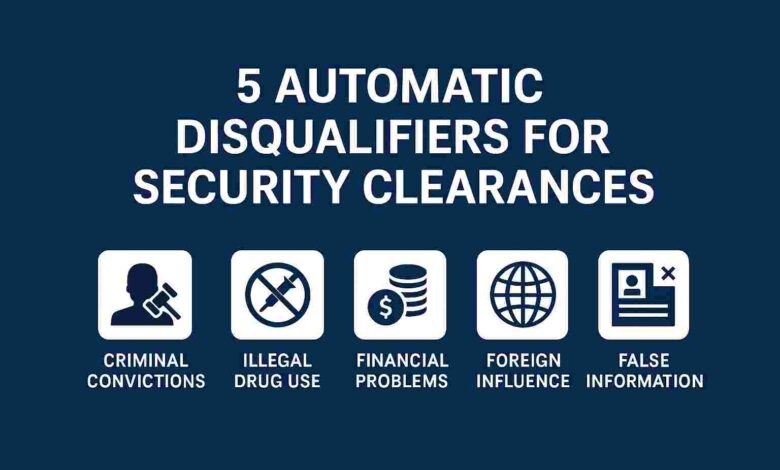5 Automatic Disqualifiers for Security Clearances: A Complete Guide to Avoiding Disqualification
Understand the top factors that can revoke your eligibility and protect your future career

Introduction
Obtaining a security clearance is a critical step for many careers in government, military, defense, and private sectors dealing with sensitive information. However, the process is rigorous and requires an in-depth evaluation of a person’s trustworthiness, loyalty, and reliability. There are certain automatic disqualifiers for security clearances that can instantly end your chances of approval. These disqualifiers are designed to protect national security and prevent classified information from falling into the wrong hands.
In this article, we will discuss the five major disqualifiers, including criminal convictions, illegal drug use, financial instability, foreign influence, and dishonesty during the clearance process. Understanding these factors can help you prepare and avoid costly mistakes. This comprehensive guide will also highlight related concerns like felony records, substance abuse, foreign contacts, and more, providing you with a clear roadmap for success.
Understanding Security Clearances
A security clearance grants individuals access to classified or sensitive information that is vital to national defense. The process involves a deep investigation into your background, personal conduct, and potential risk factors. Agencies assess factors such as mental health assessments, loyalty concerns, and personal conduct to determine if you pose a security threat.
The clearance process follows strict adjudicative guidelines. Even a single red flag, such as unauthorized disclosure or mishandling classified information, can result in denial. Therefore, being fully transparent and maintaining a clean record is essential.
The 5 Automatic Disqualifiers for Security Clearances
1. Criminal Convictions and Serious Criminal Behavior
Criminal history is one of the most common automatic disqualifiers. A felony record or recent criminal activity demonstrates a lack of judgment and trustworthiness. Even a pattern of criminal behavior involving theft, fraud, or violence can create doubts about your ability to protect classified information.
For instance, a single criminal conviction for a serious offense like espionage, terrorism, or treason will automatically result in permanent disqualification. Agencies evaluate not only the nature of the crime but also its recency and whether you’ve shown rehabilitation.
2. Illegal Drug Use and Substance Abuse
Illegal drug use is another major red flag during the clearance process. Current or recent use of controlled substances such as cocaine, heroin, or methamphetamines will almost always lead to disqualification. This includes drug addiction, drug distribution, or misuse of prescription drugs.
Substance abuse undermines reliability and judgment, making you susceptible to coercion or blackmail. Even alcohol abuse can be problematic if it leads to criminal acts like DUIs or workplace misconduct. Demonstrating sobriety and undergoing treatment may mitigate past issues, but ongoing abuse is non-negotiable.
3. Financial Instability and Poor Money Management
Financial problems are a surprisingly common cause of clearance denials. Excessive debt, bankruptcy, or unpaid obligations indicate a lack of responsibility and create opportunities for exploitation. Individuals with unexplained affluence may also raise suspicion of illegal activities or corruption.
The concern is that financial desperation might push someone toward selling classified information. Proper budgeting, repayment plans, and proof of responsible financial management are crucial to overcoming this disqualifier.
4. Foreign Influence and Loyalty Concerns
Having strong foreign ties is a sensitive issue. Foreign influence, foreign preference, dual citizenship, and foreign assets can lead to doubts about where your loyalties lie. Agencies are concerned that foreign governments or entities might coerce or manipulate you.
Even frequent foreign contacts, constant travel abroad, or foreign residency can raise red flags. While international relationships are not inherently bad, failing to disclose them or prioritizing foreign interests over national security is a serious issue.
5. Dishonesty or Lack of Candor During the Process
The final and perhaps most critical disqualifier is dishonesty. False statements, lack of candor, or omitted information on the clearance application are automatic grounds for denial. This includes lying about past criminal convictions, drug use, or foreign affiliations.
Agencies value transparency. Even minor mistakes can be forgiven if disclosed honestly, but deliberate deception or deceit during background checks permanently destroys trust.
Additional Disqualifying Factors to Consider
Psychological Conditions
Certain psychological conditions may disqualify an applicant if they significantly affect judgment or stability. A mental health assessment is often conducted to evaluate risk factors. The key is demonstrating treatment and management of the condition to show you remain reliable.
Security Violations
Acts such as unauthorized disclosure, mishandling classified information, or negligence in security protocols are taken extremely seriously. These actions directly jeopardize national security and often result in permanent clearance loss.
Quick Bio Table
| Factor | Description | Risk Level |
|---|---|---|
| Criminal Convictions | Felony record, repeated offenses | Very High |
| Drug Use | Illegal drug use, addiction, distribution | High |
| Financial Instability | Bankruptcy, excessive debt, unexplained affluence | High |
| Foreign Influence | Dual citizenship, foreign assets, foreign preference | Very High |
| Dishonesty | False statements, lack of candor, deceit | Very High |
Conclusion
The five automatic disqualifiers for security clearances are designed to protect sensitive information and national security. By avoiding criminal convictions, steering clear of illegal drug use, managing finances responsibly, limiting foreign influence, and maintaining honesty throughout the process, you significantly improve your chances of success.
Always be proactive in addressing potential concerns. Whether it’s seeking help for substance abuse, creating a financial recovery plan, or being transparent about past mistakes, demonstrating integrity and growth can make a difference. Remember, a security clearance is both a privilege and a responsibility that demands the highest level of trustworthiness and accountability.
Frequently Asked Questions (FAQ)
What is the most common reason for clearance denial?
Financial issues such as excessive debt and unpaid obligations are among the most common reasons because they pose a risk of coercion or bribery.
Can past drug use be forgiven?
Yes, if the illegal drug use was in the distant past and you can demonstrate sobriety and rehabilitation, it may be mitigated.
Is dual citizenship always disqualifying?
Not always. However, failure to disclose dual citizenship or prioritize U.S. interests over foreign affiliations can lead to disqualification.
How important is honesty in the application?
Extremely important. Even minor omitted information can result in denial due to lack of candor or false statements.
What should I do if I have a past criminal record?
Disclose it honestly and provide evidence of rehabilitation. While some felony records are automatic disqualifiers, minor past offenses may be mitigated with time and good conduct.



